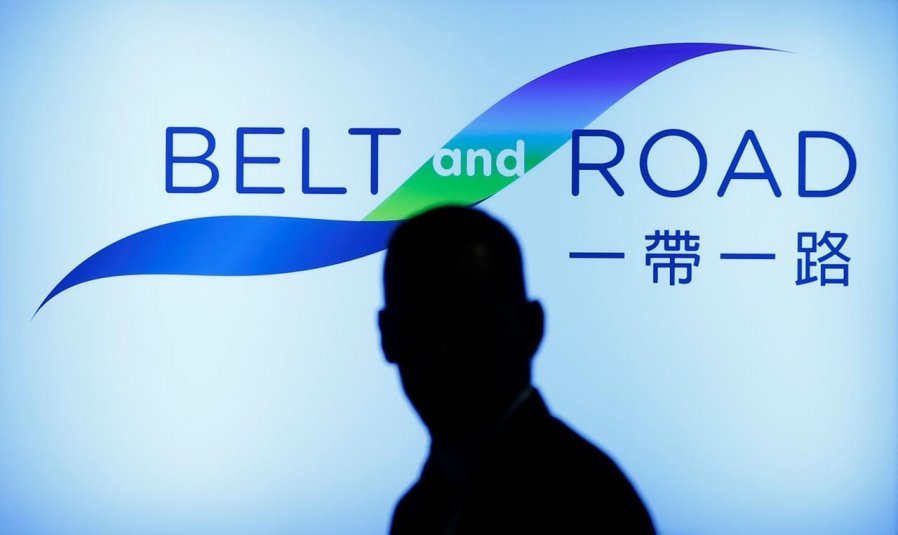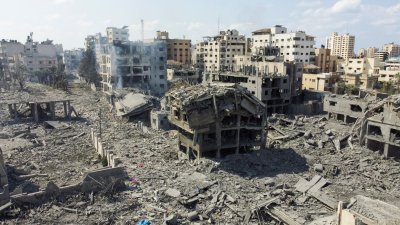世界银行前副行长依斯迈塞拉格尔丁,在上周于北京举行的“一带一路”国际合作高峰论坛智库交流专题论坛表示,世界秩序需要重组。中国在许多课题的参与,可引导世界走向基于共同人性的新秩序。
然而,西方领袖和政策制定者一直在推动一场关键、高压的运动,以破坏并推翻任何足于挑战美国和其盟友利益的新世界秩序。
在这场保护西方主导地位并统治世界80亿人口的“生死存亡”之战中,(包括美国、加拿大、澳洲、纽西兰和欧盟28个国家在内的西方国家总人口不到10亿),关键就在于妖魔化8月23日于南非举行会议的金砖国家,如巴西、俄罗斯、印度、中国和南非;以及打压10月18日在北京召开会议的“一带一路”倡议(BRI)。
第一个“战场”具有政治议程,旨在维持美国对世界地缘政治和国际秩序的控制和霸权,而其言词就包括建立自由民主制度、促进人权和自由,以及打击邪恶轴心、威权主义和独裁政权。
第二个“战场”则有著经济议程,以承诺更大的投资和贸易;为美国、西欧及其亚洲盟友日本和韩国的贸易伙伴带来经济利益;以及与美国经济领导力和支撑全球经济的美元体系相关联的经济进步。
西方未能兑现其所谓在尊重南方国家的独立、权利和需求之际,非歧视和对贫穷弱势国家实现全球资源公平分配和增长的言辞,这使得人们怀疑其要打造的一个更加平等的国际秩序承诺。这也突显了那些反对金砖国家和一带一路计划的势力背后的动机和虚伪。这也可解释为何国际媒体的新闻报导和评论,专注于诋毁任何可挑战西方主导世界的抱负和目标。
实际上,自成立以来,金砖国家组织一直普遍被讥讽和忽视,被视为一个“大杂烩”的联盟,在国际经济和政治中无法构成任何影响力。
金砖国家进展
可当下的局面却出现了反转。到了2024年1月,金砖国家将拥有11个成员国,成为全球最热门的地缘政治和经济俱乐部。新成员包括世界石油和天然气巨头伊朗、沙地阿拉伯和阿拉伯联合酋长国,这将使金砖国家拥有巨大的经济影响力。
与此同时,另有16个国家已申请加入金砖集团,这包括阿尔及利亚、巴林、孟加拉、白俄罗斯、玻利维亚、古巴、洪都拉斯、印尼、哈萨克斯坦、科威特、尼日利亚、巴勒斯坦、塞内加尔、泰国、委内瑞拉和越南。此外,阿富汗、安哥拉、科摩罗、刚果民主共和国、加蓬、几几内亚比绍、墨西哥、尼加拉瓜、巴基斯坦、苏丹、叙利亚、突尼斯、乌干达、乌拉圭和津巴布韦也表示有兴趣加入金砖国家。
金砖国家主导的世界经济秩序可能会在2030年之前到来。根据国际货币基金组织的数据,西方主导的七国集团占全球生产总值(GDP)的份额将从今年的43.5%下降到2028年的41.1%,而拥有11个成员国的金砖国家,全球GDP的比重将由今年的29.1%增加到5年后的31.4%。这发展将趋明显,尤其越来越多的南方国家,特别是在非洲,如当下的撒哈拉和西非地区国家,反法国和欧盟国家的新殖民主义情绪日益强烈。
一带一路进展
至于“一带一路”,则遭到了西方媒体更严厉的抨击。由于它是中国提出的概念,自十年前提出以来就一直被指为具有中国议程的地缘政治工具,对参与国几乎没有任何好处,反之给参与国带来沉重的债务负担。
然而,西方媒体隐瞒了读者真实的数据。
根据中国在北京举行的“一带一路”国际合作高峰论坛期间发布的《一带一路:构建人类命运共同体的重大实践》白皮书,截至2023年6月,中国已与五大洲150多个国家和30多个国际组织签署200多项合作协议。
中国国家主席习近平表示,为了实现共同发展繁荣,“一带一路”合作不搞意识形态对立、地缘政治博弈和集团政治对抗。
“我们也反对单边制裁,经济胁迫和脱钩断链。”
“这就是为什么一带一路从未对其他国家的发展构成威胁。”
来自其他国家的代表对比一带一路和西方形式的发展合作后,表达了对一带一路的支持。
根据巴基斯坦“国观智库”执行总监纳欣的说法:“与西方主导的模式相反,一带一路优先考虑实用基础设施和经济发展,而不会强加政治条件。”
印度总理办公室前运营主任苏丁德拉强调:“一带一路已经成为现代世界史上最大、最有益的项目,促进共同发展和共同繁荣。”
无需质疑,西方领袖和媒体将竭尽所能,试图抹黑金砖国家和一带一路。也将有试图分裂这些组织成员国,破坏这两个集团的成就和未来计划的企图。很显然,南方国家正在改变西方主导的历史,这一次,西方将很难扭转局面。
林德宜《美国和西方对抗世界新秩序》原文:US and West Battle Against a New World Order
Former World Bank Vice President Ismail Serageldin says the world order needs restructuring. And China's involvement in many issues could lead the world towards a new order based on common humanity. The Think Tank Conference of the Belt and Road Forum, Beijing, 20 October 2023
Western leaders and policy makers have continually engaged in a high priority, high pressure campaign to undermine and bring down any form of a new world order that challenges the existing world order benefitting the United States and its allies.
Key in the existential battle to preserve Western dominance and leadership of the world’s population of over 8 billion in 195 countries (western countries comprising the US, Canada, Australia, New Zealand and 28 countries of the European Union have a total population of under 1 billion) are the efforts to demonise the Brazil, Russia, India, China and South Africa grouping (BRICS) which met in South Africa on 23rd August; and the Belt and Road Initiative (BRI) grouping which met in Beijing on 18 October.
The first battle has a political agenda aimed at maintaining US control and hegemony over the world's geopolitics and international order. Buzz words associated with this campaign are building liberal democracies; promoting human rights and freedoms; and fighting the axis of evil, authoritarianism and dictatorships.
The second has an economic agenda which promises greater investment and trade; economic benefits for the trading partners of the United States, Western Europe and its Asian allies of Japan and South Korea; and economic progress associated with the economic leadership of the US and with the dollar regime underpinning global economic exchange.
The failure of the West to live up to its rhetoric of equitable growth, non-discrimination and fair distribution of global resources for the poor and powerless whilst respecting the independence, rights and needs of the global South has cast doubts on their commitment to a more equal international world order. It has also brought into the limelight the motives and hypocrisy of the forces behind the anti-BRICS and anti-BRI campaigns. This explains the international media’s news coverage and commentaries which have focused on discrediting the aspirations and objectives of what is emerging as the most potent challenge to business as usual in a western-dominated world.
Since its establishment, BRICS has been routinely disparaged and dismissed as a “hodgepodge” of nations that would never amount to any kind of force or weight in international economy and politics.
BRICS Progress
What we are seeing today has turned out to be the reverse. BRICS is the hottest geo-political and economic club in the world with 11 member countries as of January 2024. The new members include the world’s oil and gas giants of Iran, Saudi Arabia, and the United Arab Emirates which will give the grouping considerable economic clout. Meanwhile another 16 countries have applied to join this bloc. They include Algeria, Bahrain, Bangladesh, Belarus, Bolivia, Cuba, Honduras, Indonesia, Kazakhstan, Kuwait, Nigeria, Palestine, Senegal, Thailand, Venezuela and Vietnam. Meantime, Afghanistan, Angola, Comoros, DR Congo, Gabon, Guinea-Bissau, Mexico, Nicaragua, Pakistan, Sudan, Syria, Tunisia, Uganda, Uruguay and Zimbabwe have expressed interest in BRICS membership.
It is possible that a BRICS dominated world economic order will arrive before 2030. According to International Monetary Fund data, the Western dominated G7's share of global GDP will fall from 43.5 per cent this year to 41.1 percent in 2028, while the 11-member-version BRICS will account for 29.1 percent of GDP this year to 31.4 per cent in five years' time. This unprecedented development will become more pronounced as more South countries, especially in Africa, turn against the neo-colonialism of France and other EU countries as is happening now in the Sahel countries and West Africa.
BRI Progress
As for BRI, it has received even harsher criticism from western media. Because it has been conceptualised by China, it has been alleged since it began its journey ten years ago to be simply a self-serving geopolitical tool with little or no benefit for participating countries whilst imposing heavy debt burdens on them.
The actual record which Western media has concealed from its readers?
By June 2023, China had signed more than 200 BRI cooperation agreements with over 150 countries and 30 international organisations across five continents, according to the white paper "The Belt and Road Initiative: A Key Pillar of the Global munity of Shared Future" that China released during the Beijing summit of BRI.
Chinese President Xi has explained that in pursuit of common development and prosperity, ideological confrontation, geopolitical rivalry and bloc politics are not a choice in BRI cooperation.
"What we stand against are unilateral sanctions, economic coercion and decoupling and supply chain disruption."
"This is why the BRI is never a threat to others' development."
Representatives from other countries have expressed support for the difference between the BRI and Western forms of development cooperation.
According to Naseem Khan Achakzai, Executive Director of the Grandview Institution in Pakistan: "Contrary to the Western-led model, the BRI prioritises pragmatic infrastructure and economic development without imposing political conditions."
Sudheendra Kulkarni, former Director of Operations of the Prime Minister's Office of India has emphasised: "The BRI has become the largest and most beneficial project in the modern history of the world to promote common development and common prosperity."
We should have no doubt that western leaders and media will try every trick in the book to discredit BRICS and BRI. There will also be attempts to divide the membership and undermine the achievements and future plans of the two groupings. But it is clear that history is being revised by the global South and this time around, there will be no turning back.
要看最快最熱資訊,請來Follow我們 《東方日報》WhatsApp Channel.


















